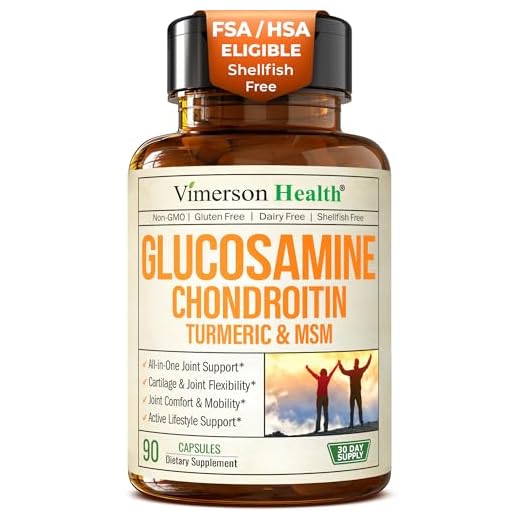







Yes, certain multivitamins can improve joint health. Vitamins C, D, and E are particularly beneficial, as they help reduce inflammation and promote bone health. Studies show that multivitamins considerably lower C-reactive protein levels, a marker for inflammation, in many arthritis patients. Additionally, glucosamine and chondroitin supplements specifically enhance joint function. However, always consult your healthcare provider before starting any supplement regimen, as individual needs can vary. By considering a balanced diet, exercise, and proper hydration alongside supplements, you can further support your joints, and there's more to discover about optimizing your joint health.
Key Takeaways
- Multivitamins containing vitamins C, D, and E can reduce inflammation and improve joint health.
- Glucosamine and chondroitin are supplements specifically formulated to support joint function.
- Essential minerals like zinc enhance immune function, which is vital for managing arthritis symptoms.
- Multivitamins may lower C-reactive protein levels, indicating reduced inflammation in arthritis patients.
- Consultation with healthcare providers is recommended before starting any joint health supplements.
Overview of Joint Health
Maintaining joint health is fundamental for ensuring mobility and enhancing your overall quality of life. With over 58.5 million adults in the U.S. affected by arthritis, it's important to understand how factors like osteoarthritis can impact your joints. Osteoarthritis, the most common form of arthritis, leads to the breakdown of cartilage, resulting in pain and limited range of motion. Additionally, deficiencies in essential nutrients, such as thiamine deficiency, can contribute to muscle weakness and affect overall mobility, further complicating joint health. To support joint health, regular physical activity and a balanced diet are imperative. Engaging in low-impact exercises can help maintain flexibility and strength, reducing discomfort associated with arthritis. Additionally, certain vitamins, particularly Vitamin D, C, and E, are significant for joint health. Deficiencies in these vitamins have been linked to increased severity of arthritis symptoms.
Incorporating supplements can also play a role in managing inflammation. Multivitamins may help lower levels of C-reactive protein (CRP), which is associated with systemic inflammation in arthritis patients. By focusing on these strategies, you can enhance your joint health and potentially experience improved pain relief, allowing you to enjoy a more active and fulfilling life.
Key Multivitamins for Joint Support
When it comes to supporting joint health, specific multivitamins can offer significant benefits. Vitamins C, D, E, and K play essential roles in reducing inflammation and promoting bone health, making them important components of any joint-supporting multivitamin. Research indicates that these multivitamins can lower C-reactive protein (CRP) levels, which are linked to the severity of arthritis and systemic inflammation. Additionally, adequate vitamin D is essential for bone mineralization, and its deficiency can lead to weak and brittle bones, further exacerbating joint issues.
Vitamin D, in particular, is critical for reducing joint pain, especially for those suffering from arthritis. Including it in your dietary supplements can enhance your overall joint function. Additionally, vitamins B6, B12, and folate contribute to energy production, helping alleviate fatigue that often accompanies joint issues.
For targeted joint support, consider multivitamins that contain glucosamine and chondroitin. These ingredients are specifically formulated to improve joint function and reduce pain associated with arthritis. By choosing a multivitamin that combines these important nutrients, you can effectively support your joint health and manage discomfort. Always consult with a healthcare provider to select the right supplements for your individual needs, ensuring your joint health journey is both safe and effective.
Evidence and Research Findings
Numerous studies support the idea that multivitamins can play a vital role in promoting joint health, particularly for individuals dealing with arthritis. Research indicates that multivitamin supplementation greatly lowers C-reactive protein (CRP) levels, a marker of systemic inflammation linked to arthritis severity. In one study, high CRP levels were found in 30% of arthritis patients, but multivitamins reduced this rate to just 14%. Additionally, the inclusion of essential minerals like zinc in multivitamins can enhance immune function, which is essential for managing inflammation and supporting overall health the role of zinc in health.
Specific vitamins, including C, E, B6, B12, folate, and beta carotene, have been shown to contribute to reducing inflammation in arthritis patients. These vitamins can effectively support your health by addressing nutritional gaps that may exacerbate arthritis symptoms. While multivitamins may not be commonly recommended for arthritis management, their potential benefits highlight an important aspect of joint care.
Incorporating multivitamins into your routine could provide additional support for joint health and overall wellness. As the research suggests, enhancing your vitamin intake might help mitigate inflammation and improve your quality of life. Always consult with a healthcare professional before starting any supplementation, but consider the evidence that highlights how multivitamins can be a valuable part of your joint health strategy.
Safety and Risks of Supplements
While multivitamins can offer significant benefits for joint health, including enhancing immune responses and reducing inflammation, it's important to contemplate the safety and potential risks associated with their use. First and foremost, you should consult a healthcare provider before starting any supplements, as they can advise you on interactions with medications or underlying health conditions. This is especially vital if you're considering high-dose fish oil, which may increase bleeding risk for those on anticoagulants like warfarin. Additionally, maintaining adequate levels of vitamins, particularly vitamin D, is essential for a balanced immune system, as deficiencies can compromise immune functionality and increase susceptibility to infections the role of vitamin D in immunity.
Be mindful of dosage, particularly with fat-soluble vitamins such as A, D, E, and K, which can accumulate in your body and lead to toxicity if taken excessively. It's worth noting that while supplements aren't rigorously FDA-approved, reputable brands generally follow good manufacturing practices. Consequently, you need to remain vigilant about product quality and ingredient accuracy.
Always read supplement labels carefully to avoid allergens and ascertain the product doesn't contain harmful substances or excessive dosages. By taking these precautions, you can maximize the potential benefits of multivitamins for joint health while minimizing the risks associated with their use.
Lifestyle Factors for Joint Health
Maintaining joint health hinges on a combination of lifestyle factors that can greatly influence your overall well-being. Staying active is essential; regular physical activity, including low-impact exercises like swimming and yoga, can enhance joint flexibility and alleviate discomfort. This is particularly important for your weight-bearing joints, as they endure more stress.
A balanced diet plays a fundamental role, too. Incorporating anti-inflammatory foods such as fruits, vegetables, whole grains, and omega-3 fatty acids can considerably reduce inflammation and support joint health. Monitoring your weight is equally important; excess body weight can exacerbate arthritis symptoms and place additional stress on your joints.
Hydration shouldn't be overlooked, either. Adequate water intake helps lubricate your joints, preventing stiffness and discomfort. Finally, prioritize quality sleep, as it's essential for joint recovery and inflammation reduction. Poor sleep patterns can negatively impact your pain perception and overall joint health.
Conclusion
Incorporating specific multivitamins can be like adding armor to your joints, helping to bolster their strength and flexibility. While vitamins like D, C, and E show promise in supporting joint health, remember that they work best alongside a balanced diet and healthy lifestyle. Ultimately, it's crucial to consult with a healthcare professional before starting any supplement regimen. By taking a proactive approach, you can pave the way for healthier, more resilient joints as you age.




